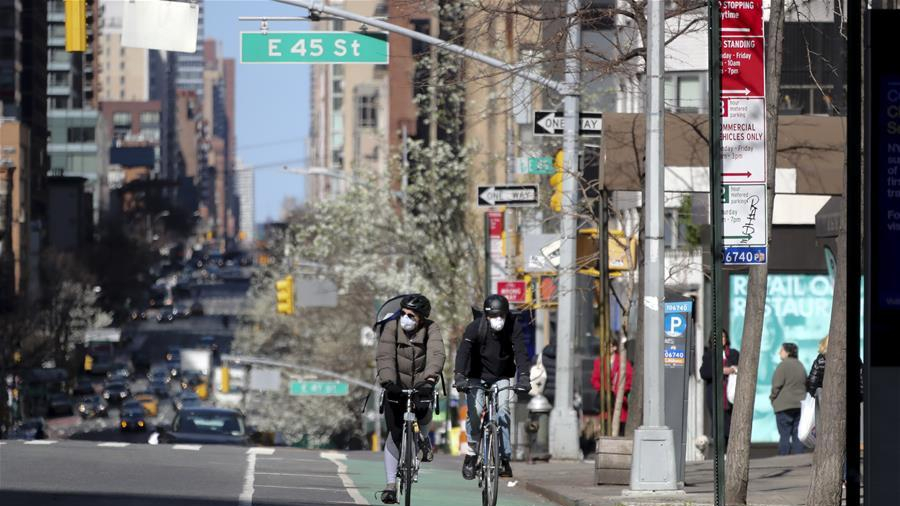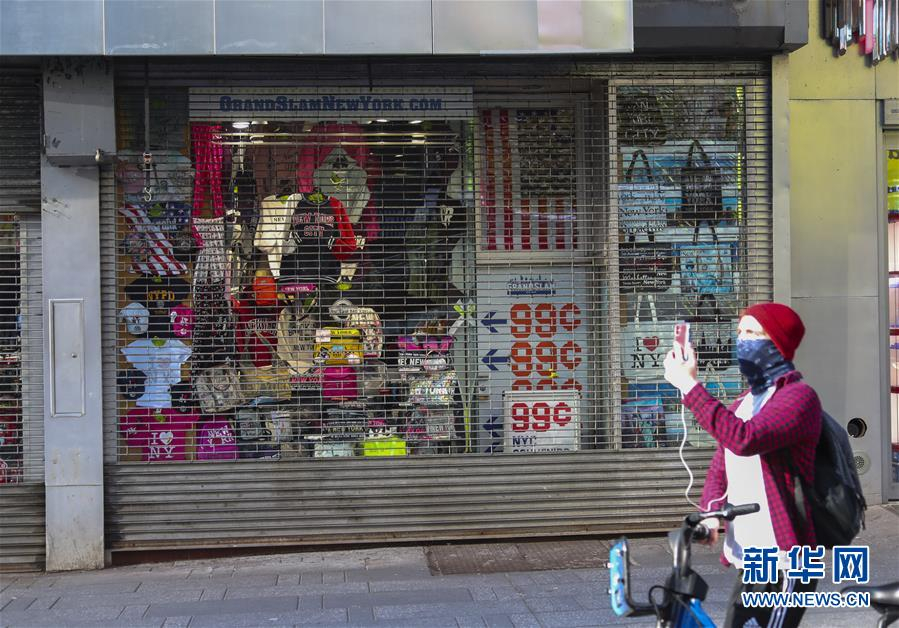
People wear masks as they ride bicycles on second avenue in New York, U.S., March 21, 2020. /Xinhua Photo
People wear masks as they ride bicycles on second avenue in New York, U.S., March 21, 2020. /Xinhua Photo
Editor's note: Shang-Jin Wei is a former chief economist at the Asian Development Bank, professor of Finance and Economics at Columbia Business School and Columbia University's School of International and Public Affairs. The article reflects the author's opinions and not necessarily the views of CGTN.
Back in January, I predicted that the spread of the new COVID-19 coronavirus in China would reach a turning point by the second or third week of February. Indeed, the total number of serious and critical cases in the country has been declining since February 22, and there have been no new cases in the last few days other than international travelers arriving in China. Unfortunately, new infections outside China have risen very fast, with potentially disastrous consequences for public health and the global economy.
Faced with this pandemic, policymakers can draw several useful lessons from China and other countries that were among the first to be hit by COVID-19. This is especially useful for countries that have not yet experienced a major outbreak. Above all, they must act fast.
First, governments and public-health authorities must ramp up preparations before a major outbreak occurs. When COVID-19 hits, there will be a spike in demand for testing kits, face masks, alcohol wipes, protective clothing, hospital beds, and life-support machines. Europe and the United States did not use their six-week lead time well; other countries should get ready now.
If domestic supplies of such materials are limited, then countries should consider importing more of them from China, Japan, and elsewhere. After all, most of these products are not high-tech, and can be made in many countries. China in particular is eager to resume production, and factories there have the competence and can respond speedily to a surge in global demand.
Furthermore, national contingency plans should ensure adequate numbers of hospital beds – especially in intensive-care units – in the event of a large-scale outbreak. If a national plan is not feasible or is insufficient, then the government will need to consider building new hospitals quickly, using foreign companies if necessary.
Public authorities also must advise the public early, clearly, and forcefully on how to minimize the virus's spread, through both personal hygiene and social distancing. Singapore, where health officials and even the prime minister have delivered accurate medical information to the public, is a good model to emulate.
Critically, governments need to act early and decisively to enforce social distancing as soon as there are signs of an outbreak. As Silicon Valley entrepreneur Tomas Pueyo has shown, such steps have been effective in China and likely will be necessary in many other countries.
In order to mitigate some of the economic fallout from the pandemic, policymakers must provide rapid emergency assistance to workers, firms, and financial institutions. COVID-19 will have a strong negative impact on the overall economy in the short run, and potentially on some sectors even in the medium term.

A souvenir shop suspends business in Times Square, New York, March 21, 2020. /Xinhua Photo
A souvenir shop suspends business in Times Square, New York, March 21, 2020. /Xinhua Photo
The negative supply shock caused by factory closures is transmitted via supply chains to downstream sectors around the world, including in countries not currently experiencing a major COVID-19 outbreak. In addition, the pandemic is causing incomes and demand to contract, which affects upstream sectors everywhere. The resulting decline in business income and confidence can cause a downward spiral in demand for products and services. To forestall self-fulfilling recessionary expectations, governments must quickly roll out emergency programs that may include the temporary suspension of tax and interest payments, financial support and guaranteed health benefits to workers, and financial assistance to banks.
Countries also need to make the best (or better) use of digital technologies. Robust online shopping can offset some of the economic difficulties facing retailers and factories, but this requires broad Internet availability, widespread acceptance of digital payment by firms and households, and an efficient and inexpensive delivery system. While China is fortunate to possess all three, many developing countries do not. Their governments should thus consider emergency service-sector reforms that would allow internationally competitive firms to help build infrastructure quickly in order to advance national public-health objectives.
As for economic stimulus, an internationally coordinated program will be more effective in tackling a global recession than isolated action by individual countries. This is especially true in the case of fiscal stimulus. When a government cuts taxes or provides temporary financial assistance to needy households, the increase in domestic demand may "leak" to foreign producers via increased imports. This leakage is especially significant for small and medium-size economies that have a relatively high ratio of imports to GDP, and may discourage them from pursuing enough stimulus.
International coordination can help to solve this problem. When all countries boost their total demand, exchange rates do not need to move as much, and the increase in global demand will benefit all. The G20 or the International Monetary Fund can play a crucial coordinating role in this regard.
Finally, reducing tariffs and non-tariff trade barriers also can help to fight a pandemic-induced recession. Many major central banks have already cut their policy interest rates to nearly zero, and thus are limited in how much more they can do. But many countries maintain various trade barriers that both raise production costs and reduce domestic households' real incomes.
While the risk of a recession often tempts governments to raise trade barriers further, the exact opposite is needed to boost global output and employment. As with fiscal expansion, coordinated trade liberalization offers the best chance of success, because each country's "concessions" to foreign firms will be met with improved access for their own companies to foreign markets. The World Trade Organization and the G20 need to step up their leadership in this area.
The COVID-19 pandemic threatens the world with disaster. But the crisis also offers governments a rare chance to undertake policy changes that not only address the short-term public-health challenge, but also boost the global economy's long-term growth potential.
While the Chinese did not actually invent all the interesting sayings attributed to them, it is true that the Chinese phrase for "crisis" consists of a character signifying "danger" and another for "opportunity." Governments around the world should seize the moment and not waste the COVID-19 crisis.
Copyright: Project Syndicate, 2020.
(If you want to contribute and have specific expertise, please contact us at opinions@cgtn.com.)